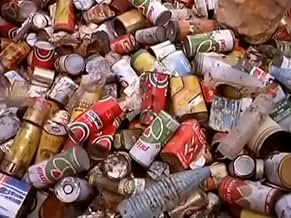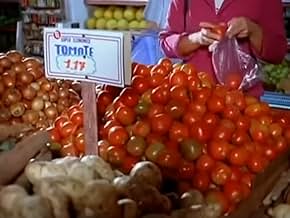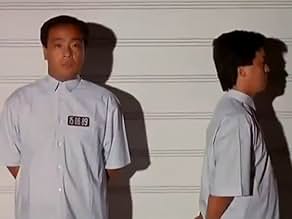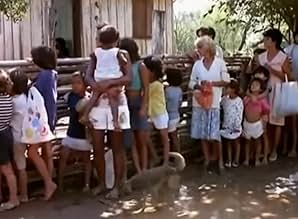IMDb RATING
8.5/10
6.9K
YOUR RATING
A tomato is planted, harvested, transported and sold in a supermarket, but it rots and ends up in the trash. The film follows it to its true end, all to make clear the difference between tom... Read allA tomato is planted, harvested, transported and sold in a supermarket, but it rots and ends up in the trash. The film follows it to its true end, all to make clear the difference between tomatoes, pigs, and human beings.A tomato is planted, harvested, transported and sold in a supermarket, but it rots and ends up in the trash. The film follows it to its true end, all to make clear the difference between tomatoes, pigs, and human beings.
- Director
- Writers
- Stars
- Awards
- 4 wins total
- Director
- Writers
- All cast & crew
- Production, box office & more at IMDbPro
Featured reviews
10huineman
Very seldom is one given the opportunity to watch a documentary like Ilha das Flores. It is less a TV product than an essay not written but filmed, and well filmed indeed. The ideas displayed throughout barely quarter an hour are so many and so profound that you might need more than one view to assimilate them all; but the script is so agile that you will never grow bored. Instead, even if you are not in the mood for documentaries at the beginning, will find yourself deeply interested in this humble production within minutes, if not seconds. But remember, you are not dealing with an entertainment product but with one of the best lessons of ethics you might come across ever. Anyway, that you will realize for sure at the end of the film, when its ideas, lingering in your head, will keep you pensive for long.
This short is a fine example of people with something crucial to say, having to bend to commercial whims of entertainment in order to hold the audience's attention span long enough to get the message across. It is remarkably witty, and runs at a fanatical pace. The jokes cause a smile, but when the holocaust clips arise, we get the clue that there are weighty matters at stake here. People need to see films like this. Remarkably effective.
10Trufó
Funny at first, demolishing in the end. When I saw this movie for the first time I spend the first minutes laughing: the editing is fast paced and the voice over explains one after another different concepts that apparently are barely connected. But in the end all grows into a perfectly mounted description of the economical and political aberrations of our times, all in less than 30 minutes.
I'm using my personal VHS copy of this excellent short in my environmental awareness classes for high school, and students are always stroked by its accurate and intelligent issues.It always provides very large and useful discussion about environmental issues.
With a very well humored screenplay and very well balanced use of fiction, documentary and table top animation, this short gives you an overview of what happens in our affluent society with any natural or produced good, with domestic and industrial waste and discussing some very special social issues.
Interesting thing is that this short Ilha days Flores ( Flower Island, in English pronounced Ilya Dass Floresh) it is not outdated, not growing old and unfortunately still shocking when you think of what is happening with all the waste in our society, when people are less important than the profit made.
With a very well humored screenplay and very well balanced use of fiction, documentary and table top animation, this short gives you an overview of what happens in our affluent society with any natural or produced good, with domestic and industrial waste and discussing some very special social issues.
Interesting thing is that this short Ilha days Flores ( Flower Island, in English pronounced Ilya Dass Floresh) it is not outdated, not growing old and unfortunately still shocking when you think of what is happening with all the waste in our society, when people are less important than the profit made.
Here's a work that definitely proves how exciting and questioning a short movie picture can be.
Acting as a director, writer and producer, Jorge Furtado couragely aims a dazzling machinegun at issues as assorted as religion, Holocaust, Brazilian government, poverty, capitalism, and how human intelligence has been used throughout the ages.
Using a dialectical method, and narrating the story in a way that "even a Martian would understand", in the words of the author, the film forges a real cinematographical theorem of Brazilian deplorable situation, borrowing as the stage a neighbourhood in the city of Porto Alegre (one of Brazil's most developed ones, by the way). The degrading scenario, however, would apply to any community on the world in which the effects of money (or its lack) on the lives of its inhabitants are more visible.
In the movie's touching final take, Furtado destroys the bourgeois concept of Freedom, quoting a line from one of Brazil's greatest poetesses, Cecilia Meirelles, and leaves us wondering whether modern 'civilisation' is as far as the human intellect can take us.
Acting as a director, writer and producer, Jorge Furtado couragely aims a dazzling machinegun at issues as assorted as religion, Holocaust, Brazilian government, poverty, capitalism, and how human intelligence has been used throughout the ages.
Using a dialectical method, and narrating the story in a way that "even a Martian would understand", in the words of the author, the film forges a real cinematographical theorem of Brazilian deplorable situation, borrowing as the stage a neighbourhood in the city of Porto Alegre (one of Brazil's most developed ones, by the way). The degrading scenario, however, would apply to any community on the world in which the effects of money (or its lack) on the lives of its inhabitants are more visible.
In the movie's touching final take, Furtado destroys the bourgeois concept of Freedom, quoting a line from one of Brazil's greatest poetesses, Cecilia Meirelles, and leaves us wondering whether modern 'civilisation' is as far as the human intellect can take us.
Did you know
- TriviaThe short opens with three short sentences on screen: "Este filme não é um filme de ficção. Existe um lugar chamado Ilha das Flores. Deus não existe." [This film is not a work of fiction. There is a place named Island of Flowers. God does not exist.]
- ConnectionsFeatures Les camps de concentration (1945)
Details
- Release date
- Country of origin
- Language
- Also known as
- Isle of Flowers
- Filming locations
- Ilha das Flores, Porto Alegre, Rio Grande do Sul, Brazil(30º 12' 30" S, 51º 11' 21" W)
- Production company
- See more company credits at IMDbPro
- Runtime13 minutes
- Sound mix
- Aspect ratio
- 1.37 : 1
Contribute to this page
Suggest an edit or add missing content





















